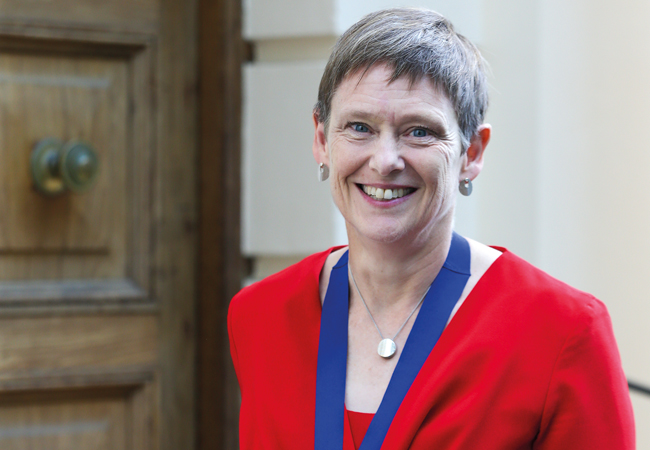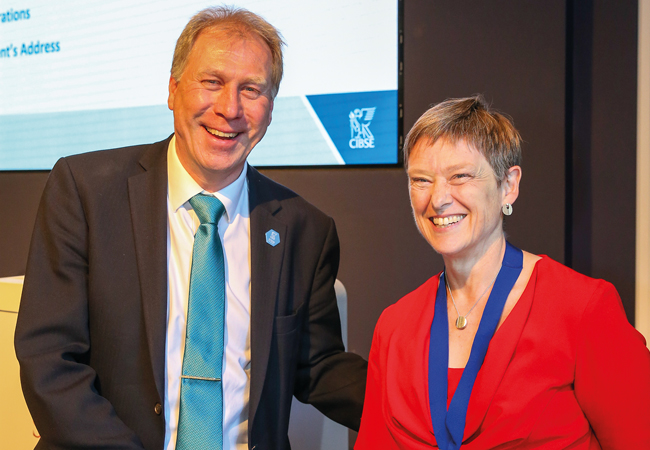
CIBSE President Fiona Cousins wants building services engineers to ‘save civilisation’
‘I think I’ve started with a bit of a bang.’ Fiona Cousins FCIBSE may have lived in America for 18 years, but she describes the impact of her first days as CIBSE President with typical English reserve.
In her Presidential address at the Royal Society of Engineering in London last month, Cousins called on building services engineers to ‘save civilisation’, to look at the wider challenges facing society and apply their skills and expertise to shape a better future.
Arup’s regional chair for the Americas told a full auditorium that engineers need to broaden their horizons and extend their understanding of building performance. ‘Buildings don’t just generate carbon – they also have impacts on our ecosystems, affecting biodiversity and air and water quality, and human health,’ she said in her address, adding that engineers need to think about the consequences of their ideas and decisions on wider society, and understand more clearly the problems they are trying to solve.
‘Einstein said if he had an hour to save civilisation he would spend 55 minutes understanding the problem, as it would then be easy to come up with a solution in the final five minutes,’ said Cousins.
‘The ready, aim phase of a project is really important to ensure we are on target, and to drive the change we need to get ahead of the world around us. We need to be inspirational and aspirational – and never dogmatic – as change is constant.’
To help engineers reframe the challenge, CIBSE has commissioned a paper, Building performance reimagined, to mark the start of Cousins’ presidency. A CIBSE publication supported by Arup Foresights, the paper sets out a framework for a ‘new holistic approach to building performance’. It combines the knowledge of building services specialists with insights from a diverse range of experts from across the arts, technology and the public sector.
‘We reached out beyond industry to get these alternative inputs, because they offer different perspectives on change,’ said Cousins. The aim of the document, she added, is to provide a starting point to think critically and proactively about what the future should look like in terms of performance.
Output from workshops coalesced around four core themes: variety, connectedness, readiness and emergence and, at the end of the report,there are considerations aimed at ‘bridging the gap between visionary futures and activities today’.
Core themes
The four performance metrics proposed in Building performance reimagined
Variety
Creating flexible, multipurpose spaces that encourage diversity of use and users. For building services engineers, this could mean more integration of modular, adaptable services and new technologies, and localised occupant controls, and inclusion of ecology and user experience expertise in decision-making.
Readiness
A risk-based design where changing conditions, uncertainties and vulnerabilities are assessed and mitigated. For building services engineers, this could mean understanding physical and cyber risks, and stress-testing designs for multiple scenarios – for example, modelling building performance for multiple climate change scenarios.
Connectedness
Understanding and connecting to local people, spaces and infrastructure. For building services engineers, this could mean early integration with local infrastructure, and understanding the impact the building will have on the neighbourhood and local resources by engaging with the community.
Emergence
Responding to new circular models, material and trends, providing spaces for fixing and making, and encouraging local resourcing. For building services engineers, this could mean creating buildings where energy is generated by, and stored in, the building and, potentially, distributed to the community, use of phase change material and AI, creating spaces for fixing and repurposing material and equipment, and promoting reuse and local sourcing, rather than replacing with new.
These cover economics, education and skills, governance and culture, technology, and policy and regulatory issues. For each, there are directions for four sets of ‘change enablers’, who are defined as: wider industry, regulators and policy-makers; CIBSE and institutional bodies; engineering organisations and employers; and individual building services engineers.
In an interview with the Journal after her inauguration, Cousins explains why building service engineers need to collaborate with other disciplines when engineering solutions.
‘We need to avoid siloed, linear thinking based solely on cutting costs or energy use,’ she says. ‘Engineers shouldn’t be focused on one thing; they should be looking at broader impacts, such as health and wellbeing, climate change and diversity.’
She gives an example of how a car park design with more green landscaping and reflective surfaces could contribute to climate-change mitigation and a healthier environment. ‘There’s nothing wrong with net zero goals, but if engineers are to save civilisation, they need to raise their eyes to the horizon and set broad design goals,’ Cousins says.

Adrian Catchpole passes the Presidential medal to Fiona Cousins
One major issue, she adds, is that clients are often focused on the payback for environmental features that don’t only offer a financial return. Cousins believes engineers should be looking at the benefits for society, as everyone will gain from a healthier planet.
‘Climate-change mitigation is a benefit that goes to everyone – it doesn’t go back to the designer,’ she says, adding that it’s important to make space at the beginning of a project to discuss overall goals.
‘If you can talk convincingly about goal setting at the beginning, you can usually move people away from “I want the cheapest thing” to something that makes them look best in the market.
The ready, aim phase of a project is really important to ensure we are on target, and to drive the change we need to get ahead of the world around us
‘Even the most commercial developer will say “I want everyone to know that I have a good-quality building”, and they’ll look like a hero because they have done the right thing from a climate standpoint.’
By the end of her year in office, Cousins would like CIBSE’s strategy to use the framework in Building performance reimagined. ‘The new strategy should reflect the idea that we need to push the boundaries of building performance. It will make us a forward-thinking organisation,’ she says.
There could be new CIBSE Building Performance Awards, Cousins suggests, covering areas such as acoustics and biodiversity. ‘CIBSE is very good at attracting M&E engineers working for design firms, but the conversations need to include other disciplines, such as operations engineers and user experience designers,’ she says. ‘It’s a virtuous circle. It would be good for the definition of building performance, bring more disciplines to CIBSE, and provide more diversity of views of what good looks like.’
Cousins would also like to see CIBSE publish more thought-leadership papers that address societal issues beyond engineering. ‘CIBSE does a lot of brilliant technical guidance, but we don’t generally do horizon-scanning white papers that could be supported by CIBSE Young Engineer Networks and broader voices from outside the institution,’ she says.
Cousins’ call to action is ambitious and inspiring, urging building services engineers to look beyond immediate technical solutions and consider the wider implications of their work.
As CIBSE embraces this forward-thinking approach, it stands poised to redefine what building performance means in the 21st century, creating a legacy of sustainable, healthy buildings that tread lightly on our planet and support our societies.
- CIBSE is hosting a Building Performance Reimagined conference, based on the report, on 8 October. For more information and to register: Building Performance Reimagined
